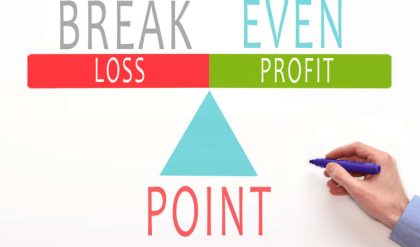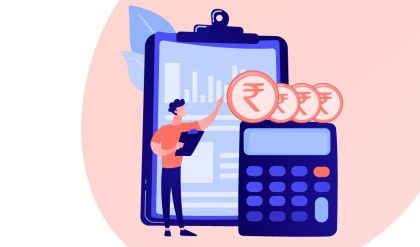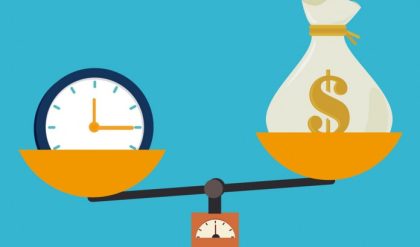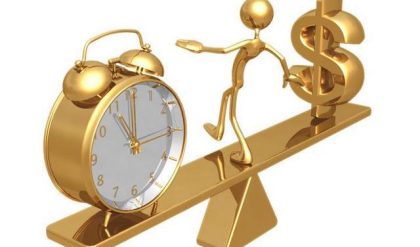Introduction Definitions and Basics
● Efficiency, by Paul Heyne, from the Concise Encyclopedia of Economics
● To economists, efficiency is a relationship between ends and means. When we call a situation inefficient, we are claiming that we could achieve the desired ends with less means, or that the means employed could produce more of the ends desired….
● New Keynesian Economics, by N. Gregory Mankiw, from the Concise Encyclopedia of Economics
● The heart of the new synthesis is the view that the economy is a dynamic general equilibrium system that deviates from an efficient allocation of resources in the short run because of sticky prices and perhaps a variety of other market imperfections….
● Efficient Capital Markets, by Steven L. Jones and Jeffry M. Netter, from the Concise Encyclopedia of Economics
● The efficient markets theory (EMT) of financial economics states that the price of an asset reflects all relevant information that is available about the intrinsic value of the asset. Although the EMT applies to all types of financial securities, discussions of the theory usually focus on one kind of security, namely, shares of common stock in a company….
● Efficiency Wage Hypothesis at Answers.com
● Wages above the market-clearing level paid by employers in order to increase the productivity, or efficiency, of their employees. The various explanations of efficiency wages include nutritional reasons (especially in developing economies), prevention of shirking, reduction in labour turnover, the adverse selection problem, and traditions….
In the News and Examples
● Richard McKenzie on Prices, EconTalk podcast. June 23, 2008.
● Richard McKenzie of the University California, Irvine and the author of Why Popcorn Costs So Much at the Movies and Other Pricing Puzzles, talks with EconTalk host Russ Roberts about a wide range of pricing puzzles. They discuss why Southern California experiences frequent water crises, why price falls after Christmas, why popcorn seems so expensive at the movies, and the economics of price discrimination….
● Diane Coyle on the Soulful Science, EconTalk podcast.
● Diane Coyle talks with host Russ Roberts about the ideas in her new book, The Soulful Science: What Economists Really Do and Why it Matters. The discussions starts with the issue of growth–measurement issues and what economists have learned and have yet to learn about why some nations grow faster than others and some don’t grow at all. Subsequent topics include happiness research, the politics and economics of inequality, the role of math in economics, and policy areas where economics has made the greatest contribution….
● Who Loses from Efficiency?, by Bryan Caplan. EconLog.
● During last night’s debate, Robin repeated an argument many economists have made: In the long-run, maximizing efficiency is actually better for everyone.� If we consistently adopt any policy with benefits greater than costs, then the times that you win will outweigh those that you lose, so you’ll be better off on net.� Optional escape hatch: Even if you don’t happen to win on net, you can still ex ante expect to win on net; efficiency raises everyone’s expected well-being.
● When I give my lecture on efficiency, I always point out how crazy this claim is.� “Everyone” means everyone.� The world has over six billion people.� Some of them have really weird preferences; a subset of these people with weird preferences are already extremely satisfied.� Is it really likely–or even credible–that every single one of these people would be better off if we junked all inefficient policies?…
● Do you prefer cash or money as a gift? The Economics of Valentine’s Day, a LearnLiberty video.
● Economics professor Christopher Coyne sits down for an interview about the economics of Valentine’s Day. Why can the most economically efficient gift also be the most offensive? What does this have to do with deadweight loss? What would Bastiat say?
● Daniel Botkin on Nature, the Environment and Global Warming, EconTalk podcast.
● Daniel Botkin, ecologist and author, talks with EconTalk host Russ Roberts about how we think about our role as humans in the natural world, the dynamic nature of environmental reality and the implications for how we react to global warming….
● Natural Resources, from the Concise Encyclopedia of Economics
● The earth’s natural resources are finite, which means that if we use them continuously, we will eventually exhaust them….
● They Clapped: Can Price-Gouging Laws Prohibit Scarcity?, by Michael Munger. Econlib, January 8, 2007.
● Hurricane “Fran” smashed into the North Carolina coastline at Cape Fear at about 8:30 pm, 5 September 1996. It was a category 3, with 120 mph winds, and enormous rain bands. It ran nearly due north, hitting the state capital of Raleigh about 3 am, and moving north and east out of the state by morning….
● There were no generators, ice, or chain saws to be had, none. But that means that anyone who brought these commodities into the crippled city, and charged less than infinity, would be doing us a service….
A Little History: Primary Sources and References
● Lionel Robbins, biography, from the Concise Encyclopedia of Economics
● Robbins’ most famous book was An Essay on the Nature and Significance of Economic Science, one of the best-written prose pieces in economics. That book contains three main thoughts. First is Robbins’ famous all-encompassing definition of economics that is still used to define the subject today: “Economics is the science which studies human behavior as a relationship between given ends and scarce means which have alternative uses.”…
● Who coined the phrase “the dismal science”? The Secret History of the Dismal Science: Economics, Religion, and Race in the 19th Century, by David M. Levy and Sandra J. Peart. Econlib, January 22, 2001.
● Everyone knows that economics is the dismal science. And almost everyone knows that it was given this description by Thomas Carlyle, who was inspired to coin the phrase by T. R. Malthus’s gloomy prediction that population would always grow faster than food, dooming mankind to unending poverty and hardship.
● While this story is well-known, it is also wrong, so wrong that it is hard to imagine a story that is farther from the truth. At the most trivial level, Carlyle’s target was not Malthus, but economists such as John Stuart Mill, who argued that it was institutions, not race, that explained why some nations were rich and others poor….
Advanced Resources
● Lecture Notes on Efficiency, by Bryan Caplan.
● … A situation is Pareto efficient iff the only way to make one person better off is to make another person worse off….
● An Interview with N. Gregory Mankiw. May 2005
● … I have been a believer in the repeal of the estate tax for a long time. I wrote a Fortune column on that probably seven or eight years ago. I favor repeal for two reasons. One is just simple economic efficiency. I’m a believer that we should try to move towards a consumption tax and the estate tax which is a tax on capital is fundamentally inconsistent with that. So from the standpoint of efficiency it’s a bad thing….
● Some markets can be so efficient that new information is available instantly and a new market price evolves within seconds. Stock markets are a primary example. Fama on Finance, EconTalk podcast. January 30, 2012.
● Eugene Fama of the University of Chicago talks with EconTalk host Russ Roberts about the evolution of finance, the efficient market hypothesis, the current crisis, the economics of stimulus, and the role of empirical work in finance and economics….





